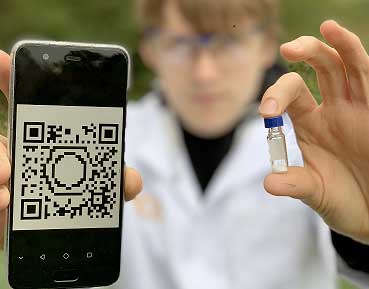| Oct 29, 2018 | |
A USB stick? In the distant future, a little powder should suffice(Nanowerk News) Whether you think about bank accounts, YouTube videos or QR codes, everything is saved as zeros and ones, or data, on a computer. So much data is collected nowadays that the storage equipment available might not be capable of holding all that information much longer. |
|
| There are two major issues. On the one hand, enormous quantities of heavy metals are needed to produce USB sticks or hard drives. On the other hand, you need huge, energy-consuming servers to keep all this information safe. | |
| For that reason, scientists from Ghent University’s chemistry, biochemistry and computer science departments have joined forces to look for new ways of storing data. In this research effort, they were inspired by nature, where genetic information is stored in DNA (Nature Communications, "Multifunctional sequence-defined macromolecules for chemical data storage"). | |
 |
|
| UGent researchers successfully researche alternative methods for storing data. | |
Chemical QR code |
|
| The researchers developed a chemical process that allowed information, such as a piece of text or a QR code, to be stored in powder form. This information can then be read out by means of a biochemical method of analysis. | |
| As a final step, two programs were written to make the processing of information run fast and automatically. The first program makes sure that the data on the molecules can be analysed in seconds, the second program automatizes the translation process from the QR code to the molecules and vice versa. | |
| That’s how the information stored in the molecules can in fact link directly to a website, a city map or an app. |
| Source: Ghent University | |
|
Subscribe to a free copy of one of our daily Nanowerk Newsletter Email Digests with a compilation of all of the day's news. |
